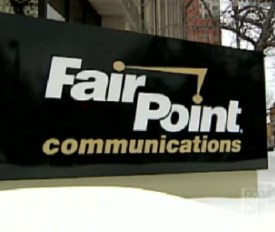This past spring Stop the Cap! started relentlessly documenting the tragic phone and broadband service that came as a result of a lousy phone deal for New Englanders. Verizon, busily wiring its larger service areas for FiOS fiber to the home service, wanted out of Maine, New Hampshire, and Vermont. In a uniquely wonderful deal (for them), they not only managed a clean break from too much regulatory red tape, but also sold off the entire operation down to the last cable, phone jack, and building absolutely tax-free to FairPoint Communications, a tiny independent phone company headquartered in North Carolina.
Since the sale, it has been one catastrophe after another: broken phone and broadband service up to weeks at a time, incorrect billing amounting to hundreds of dollars and collection calls pestering customers for money they don’t owe, investigation after investigation, broken promise after broken promise. Since we broke from the story back in June to cover some of the nonsense and ripoffs going on in Canada, things have not gotten that much better. In fact, the company’s stock has since lost 95% of its value, is defending against accusations it manipulated a “test run” of a conversion program to guarantee success (right under the noses of independent observers), a major management shakeup, and now the very real chance the entire mess is headed to Bankruptcy Court.
One member of the International Brotherhood of Electrical Workers, who loudly and, it turns out, very accurately predicted the results of this ill-conceived venture, said FairPoint is now swirling in the bowl, flushing itself, and three states’ telecommunications needs, right down the toilet.
 So at the same time Frontier Communications is trying to pick up what Verizon is throwing away this year, it’s very illustrative to continue this story, to educate our readers about what happens when consumers’ needs are totally ignored. Just as much to blame are the state regulators who are now ironically among the loudest complainers. As we’ve shown documenting this entire story, they’ve changed their tune dramatically. Back in 2007, they couldn’t say enough wonderful things about how confident they were in FairPoint, and were certain everything would work out just fine.
So at the same time Frontier Communications is trying to pick up what Verizon is throwing away this year, it’s very illustrative to continue this story, to educate our readers about what happens when consumers’ needs are totally ignored. Just as much to blame are the state regulators who are now ironically among the loudest complainers. As we’ve shown documenting this entire story, they’ve changed their tune dramatically. Back in 2007, they couldn’t say enough wonderful things about how confident they were in FairPoint, and were certain everything would work out just fine.
It did for them because they are still there, conducting the investigation about how this whole mess got started.
The Nashua Telegraph has followed this sorry story since day one:
Unable to make its massive debt payments, FairPoint will have to file for bankruptcy by month’s end unless it can strike a deal with creditors.
The company is losing land-line customers – and thus, revenue – faster than anticipated. And the celebrated launch of a TV service to compete with cable – a move FairPoint said would bring in the extra income to compensate for the decline in land-line customers – has been put on hold.
“There’s no satisfaction in saying I told you so,” said Rand Wilson, communications coordinator for the two unions that represent most FairPoint workers, which organized a major public campaign in an effort to stop the sale.
“We have to try to provide the best possible service under the circumstances and work with regulators and states to find a way to create a viable company.”
So far, that means trying to fix FairPoint from within, or hope the rumors of a buyout by Windstream, another owner of formerly independent phone companies, turns out to be real. But like FairPoint and Frontier, Windstream itself has a business model running phone service in the areas the big boys don’t want. How much of an improvement that company would provide remains an open question. Regardless, unless FairPoint works the kind of magic it has never performed for its New England customers, it’s probably only a matter of weeks before bankruptcy:
P.J. Louis, a telecom industry expert and author of 11 books on the various topics within the industry, recently wrote that he thinks it’s a realistic option for the company.
“The more and more I think about it, the more I am convinced that FairPoint needs to file,” Louis wrote in an analysis on the Gerson Lehman Group Web site. “Every horror story you hear just scares the heck out of me. Frankly, I am questioning management’s ability to see the company through this rough time.”


 Subscribe
Subscribe

